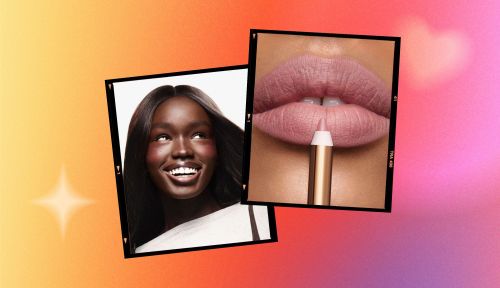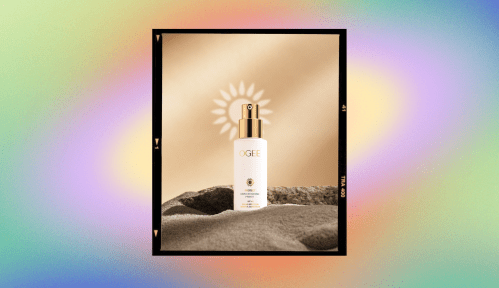Our editors independently select these products. Making a purchase through our links may earn Well+Good a commission
‘I’m a Dermatologist, and These Are the Most Common Questions People Ask Me About Eczema’
What is eczema? dermatologist answers the most common questions surrounding the inflammatory skin condition.

Eczema affects nearly 15 million Americans each year. But just because the inflammatory skin condition is common (particularly in the winter months!), that doesn’t mean it’s not confusing. It can be tough to understand what triggers it, how to treat it, and what eczema-friendly products you can (and can’t) use during flare-ups.
To help dispel this confusion and keep your skin feeling soothed, we tapped NYC-based board-certified dermatologist Dr. Hadley King to shed a little light on the most common questions surrounding eczema. Keep reading for everything you need to know.
1. What is eczema?
According to the American Academy of Dermatology, eczema is characterized by “inflamed, irritated, and often itchy” skin. While some people are born with a predisposition to eczema (it’s genetic!), others experience atopic dermatitis or contact dermatitis, which is essentially an allergic reaction to something your skin has been exposed to.
2. What do common eczema symptoms look like?
An eczema flare is characterized by dry, sensitive skin that often becomes itchy, red, and scaly, says Dr. King. “Eczema tends to be worse in the winter when the air is dry,” she adds. “It is analogous to asthma in that it is an immune-mediated hyper-reactive state.” If you’re unsure if you’re experiencing an eczema flare, Dr. King says that the most commonly affected areas include the insides of the elbows and backs of the knees, as well as the wrists and neck. “Though, any area can be affected,” she adds.
3. Can stress cause eczema to flare?
We know that stress can lead to worsening breakouts, but can it enhance eczema symptoms, too? “Stress may manifest in headaches for some people and stomach upset for others, and there may be others of us who notice that stress seems to target our skin,” says Dr. King. “We all have different target organs for stress and characteristic ways in which it shows up. For some of us, stress may show up as an acne flare, while others may experience an eczema flare. Although we do not yet have a thorough understanding of the mechanisms, we do know that stress and anxiety can impact most inflammatory skin conditions, including acne, rosacea, psoriasis, eczema, hives, and alopecia areata.”
Dr. King says that stress can impact these conditions because it causes cortisol to spike. This spike affects the immune system, which in turn creates inflammation. “Cortisol levels can also affect other hormone levels, which can play a part in skin conditions as well,” she adds. “We treat stress-related flares of any of these conditions in the same way that we would treat the condition otherwise (for example, emollients and topical cortisones for eczema), plus stress management techniques like meditation, therapy, and exercise are helpful.”
4. What should you look for in a moisturizer for eczema-prone skin?
No matter your skin type, moisturizing daily is important. That said, for eczema-prone skin—which is characterized by dryness—regular hydration is essential.
“For all ages, moisturizing and supporting the skin barrier are critical for maintenance,” says Dr. King. “That means using moisturizers that contain humectants to hydrate, emollients to support the skin barrier, and occlusives to lock in the moisture—several times daily.”
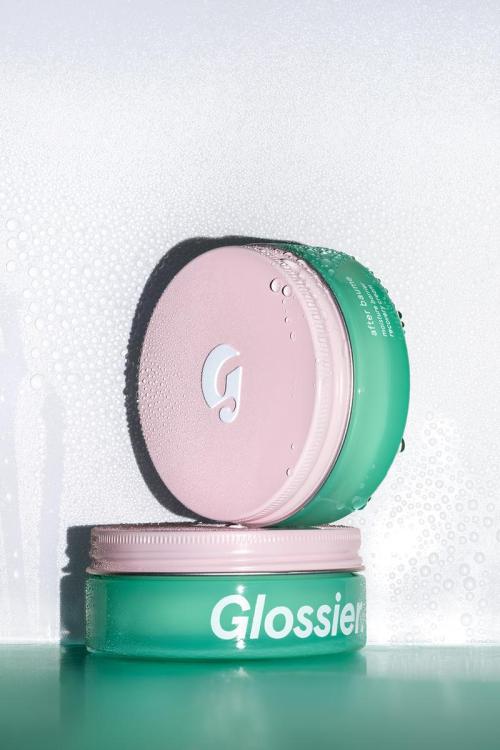
Glossier After Baume — $28.00
Touted as “a puffer jacket for your skin,” this soothing moisturizer earned the Seal of Acceptance from the National Eczema Foundation. It contains a blend of barrier-strengthening fatty acids from ingredients like cupuaçu butter and linoleic acid, and delivers antioxidant protection from babassu oil and green microalgae extract.
Dr. King also recommends humectants like hyaluronic acid and glycerin; emollients like cholesterol, squalane, fatty acids, and ceramides; and occlusives like petroleum, beeswax, mineral oil, silicones, lanolin, and zinc oxide.
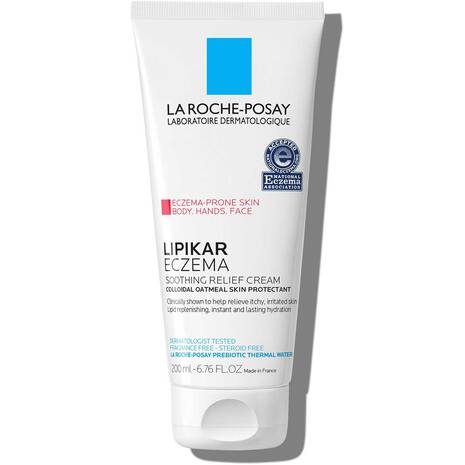
La Roche-Posay Lipikar Eczema Soothing Relief Cream — $16.00
With soothing, hydrating ingredients like glycerin and shea butter, this double-duty cream can be used on both the face and body. It’s also got colloidal oatmeal, which derms love for soothing the itching and irritation that comes along with eczema.
5. Are there specific bath and shower practices people with eczema should follow?
Since eczema essentially boils down to dry skin, you want to avoid anything that could cause it to become even more dehydrated. Sadly, that includes long, hot baths and showers.
“Showers should be brief (seven minutes or less), use lukewarm rather than hot, and [should occur] no more than once per day,” says Dr. King.
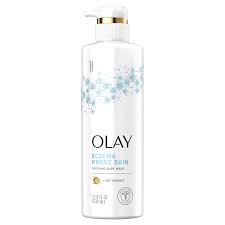
Olay Soothing Body Wash with Vitamin B3 Complex and Oat Extract — $8.00
Designed with eczema-prone skin in mind, this derm-approved body wash harnesses the calming powers of oatmeal and the inflammation-fighting abilities of vitamin B3. It’s not stripping or drying, and will leave your skin soft and soothed after you shower.
The body washes you use while bathing matter, too. “Cleansers should be gentle soap substitutes that are free of harsh detergents that will strip the natural oils from the skin, and that contain moisturizing ingredients,” Dr. King says. “Look for washes that include moisturizing ingredients, particularly emollients to support the skin barrier. Additionally, look for cream-based [formulas], with no to mild foaming, [as they are] likely to be the most supportive of the skin barrier.”
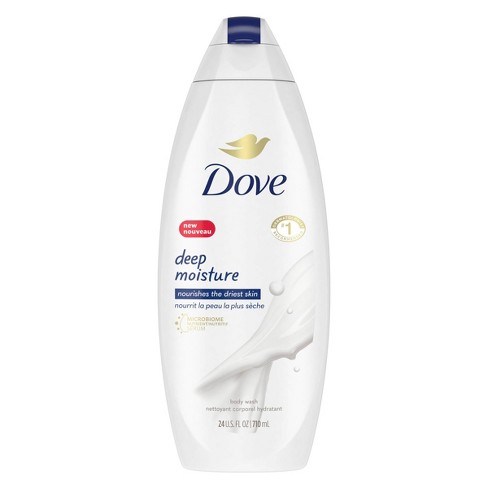
Dove Deep Moisture Body Wash — $7.00
Another derm-approved drugstore pick, this moisturizing body wash will give skin a major moisture infusion. Board-certified dermatologist Adarsh Vijay Mudgil, MD, previously called it an “excellent option” for dry skin, and its creamy, hydrating formula is just about as gentle as it gets.
For more tips on how to deal with super-dry skin, check out the video below.
Want even more beauty intel from our editors? Follow our Fineprint Instagram account) for must-know tips and tricks.
Sign up for the Well+Good SHOP Newsletter
Get exclusive deals on wellness, beauty, fitness, and food products that have been hand-picked by our editors.
Got it, you've been added to our email list.



